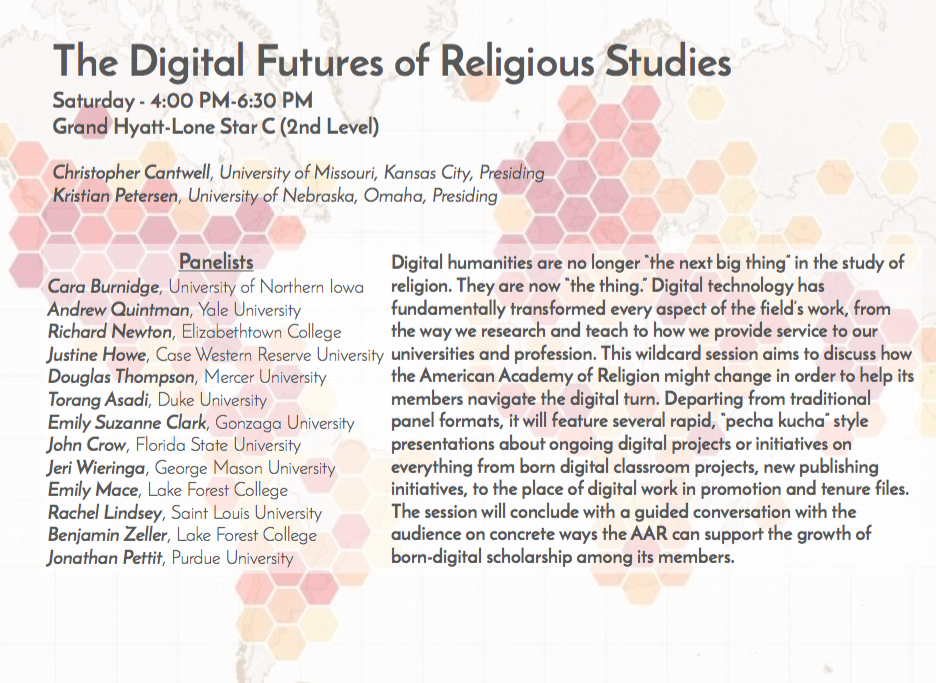The Digital Futures of Religious Studies: AAR Wild Card Session
By Chris Cantwell
For those of you planning on attending the American Academy of Religion's annual meeting in San Antonio next week, I'd like to call your attention to a special "wild card" session on the program. It's designated as a "wild card" because the AAR accepted the session without the sponsorship of a program unit. But it is also a "wild card" in that it will break with the traditional conference format. In place of formal presentations from a few scholars, the session will feature short five minute provocations on digital methods for religious studies from over a dozen panelists. To further encourage discussion over presentation, the session will even make time for an open mic so audience members can talk about their own work.
The occasion for such a wonky format is pressing need to figure out just what are the digital futures of religious studies. To say that the digital turn is changing the study of religion is to miss how digital technology has already transformed the field. Scholars now utilize databases in locating source material, employ software in analyzing data, and share their interpretations through myriad digital publications like this blog while educators incorporate social media into classroom communication, have students track the religious themes of video games, or devise collaboratively built digital projects as course assignments. Indeed, the most pressing questions relate to how our professional associations should evolve in light of these transformations. In order to spur these important conversations and make space for as many voices as possible within them, Kristian Petersen and I convened this rather large conference session.
Titled "The Digital Futures of Religious Studies," the session promises to be robust and expansive, with discussions about digital research projects, online publications, and new media teaching methods. But in addition to showcasing and celebrating our current endeavors, we also hope to plan for the future of the field by discussing what steps the AAR could take to better support this work. Should the JAAR begin reviewing digital projects? Then let's form a group to put in a formal request to the journal. Does the AAR need a digital religious studies prize? Let's form a committee to make it happen. So come for the conversation, then stay help advance the AAR's good work.
For those of you planning on attending the American Academy of Religion's annual meeting in San Antonio next week, I'd like to call your attention to a special "wild card" session on the program. It's designated as a "wild card" because the AAR accepted the session without the sponsorship of a program unit. But it is also a "wild card" in that it will break with the traditional conference format. In place of formal presentations from a few scholars, the session will feature short five minute provocations on digital methods for religious studies from over a dozen panelists. To further encourage discussion over presentation, the session will even make time for an open mic so audience members can talk about their own work.
The occasion for such a wonky format is pressing need to figure out just what are the digital futures of religious studies. To say that the digital turn is changing the study of religion is to miss how digital technology has already transformed the field. Scholars now utilize databases in locating source material, employ software in analyzing data, and share their interpretations through myriad digital publications like this blog while educators incorporate social media into classroom communication, have students track the religious themes of video games, or devise collaboratively built digital projects as course assignments. Indeed, the most pressing questions relate to how our professional associations should evolve in light of these transformations. In order to spur these important conversations and make space for as many voices as possible within them, Kristian Petersen and I convened this rather large conference session.
Titled "The Digital Futures of Religious Studies," the session promises to be robust and expansive, with discussions about digital research projects, online publications, and new media teaching methods. But in addition to showcasing and celebrating our current endeavors, we also hope to plan for the future of the field by discussing what steps the AAR could take to better support this work. Should the JAAR begin reviewing digital projects? Then let's form a group to put in a formal request to the journal. Does the AAR need a digital religious studies prize? Let's form a committee to make it happen. So come for the conversation, then stay help advance the AAR's good work.


Comments